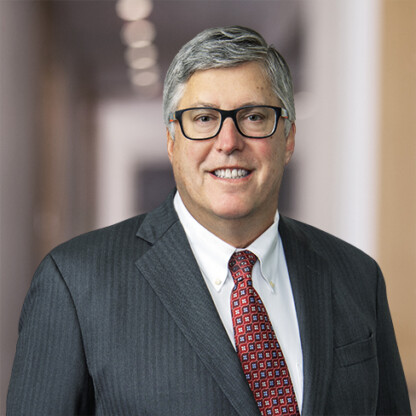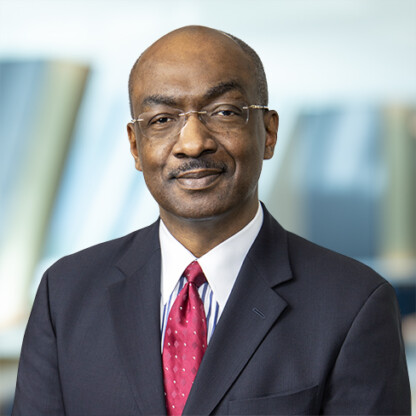When Foley opened its Detroit office in fall 2000, it began with a startup culture and just a handful of employees. Today, it’s one of the city’s premier law firms – with more than 70 attorneys and staff. Recently, some of the attorneys who have been a big part of the Detroit office’s growth reflected on the past couple decades in celebration of the office’s 20th anniversary.
What can you tell us about the early days of the Detroit office? Why was Detroit an important market for Foley to have an office and grow its presence in?
Steve Hilfinger, co-chair of the firm’s Manufacturing Industry Team and chair of the Detroit office’s Business Law Department: Foley already had some excellent clients in Detroit and Michigan, particularly in the automotive industry, so it was a matter of them telling us that if we opened an office here, they would be supportive – because they saw the benefits of having a national firm in the market. Foley also saw a lot of opportunities based on the size and depth of the Michigan market – the Michigan S&P 500 companies had more than $500 billion of aggregate revenues at the time.
John Trentacosta, former chair of the Detroit Litigation Department and founder and member of the firm’s Automotive Industry Team: Steve and I were among the first five people who opened the office in the fall of 2000. Adding a Detroit office was a strategic way to build on Foley’s existing presence in both the Midwest and the manufacturing world, specifically automotive. This office helped build on that – and not long after opening, we were able to create a more formal automotive industry practice, which has been largely supplier focused. We have been able to build on that over the years and we’re really proud of how we’ve been able to grow that.
How has the office evolved over the years?
Phil Phillips, partner and managing partner of the firm’s Detroit office: I joined the office as a fifth-year associate, a few months after it opened. We primarily supported automotive industry clients at the time, and it was a small office with only about a dozen people and there was a sense of camaraderie because we really had to support each other’s practices. But we quickly hired more attorneys and professional staff, expanded our client base and services to companies outside the automotive industry, and have continued to grow.
Daljit Doogal, chair of the firm’s national Business Law Department and member of the firm’s Management Committee: I take a lot of pride in the fact that we went from that startup environment and moved to a full-service office that’s so well-integrated within the firm. And not only do we have a strong reputation within Foley – with many individuals in Detroit holding leadership positions within the firm – we’ve become an important legal voice in the Detroit market and beyond.
Marcus Sprow, leader of the Intellectual Property Practice in the Detroit office and national chair of the Mechanical & Electromechanical Technologies Practice: The office has expanded into a lot of areas, including a significant IP practice that began when I relocated back to Detroit from our Milwaukee office in 2005. One great thing about our practice is that, from a very early point in the history of the Detroit office, we have been completely integrated across the firm between practice groups and departments. We do a significant amount of work for clients in other offices, and we’re generally a net exporter of work to other offices – so we’re able to leverage the large firm footprint to give an advantage to our local clients. We’re not an island. We’re part of the larger firm.
What have been some of the significant milestones for Foley in Detroit?
Jeff Kopp, Detroit office hiring partner and a member of the firm’s Pro Bono Committee: We’ve had some big additions over the years, including a number of bankruptcy attorneys and finance lawyers we added from other firms in the mid-2000s. That positioned us well for some really big wins, but it’s also emblematic of the fact that we have the best and brightest people and continued to attract them. We’re not just a satellite office of an international firm.
Ann Marie Uetz, former co-chair of Foley’s Automotive Crisis Response Team and head of Foley’s Coronavirus Task Force and co-founder of the firm’s Coronavirus Resource Center: One of the highlights in our practice was representing more than 100 automotive suppliers in the GM and Chrysler bankruptcies in 2009 and thereafter. We created a cross-disciplinary team including attorneys from multiple offices to help our clients through that really difficult time. Most significantly, not only did our clients survive, but many have gone on to thrive in the years since the global financial crisis. And more recently, we’ve guided our clients through the unique challenges presented by the COVID-19 pandemic.
John Trentacosta: We’ve handled major supply chain matters throughout the country and around the world. To have that national and international presence in litigating supply chain disputes is significant and pretty unique for Detroit firms. What you have in Foley is a national firm with a meaningful Detroit presence. We have a local presence and accountability with a national strength. We brought a different option to Detroit and Michigan clients because few national firms have a significant Detroit office.
Steve Hilfinger: I think our office has also done a good job of promoting diverse attorneys to leadership positions locally and the greater firm. In our 20 years, we’ve been led by persons of color for more than half of our history. This includes Phil Phillips, who joined the office in early 2001 and currently holds the job; Daljit Doogal, who joined the office in early 2001 and now chairs the firm’s 500+ member national Business Law Department; and Nicole Lamb-Hale (the first Black woman to lead a Detroit law firm, to my knowledge), who became a senior U.S. Commerce Department official under President Obama. We also have other impressive alumni of color, including Ella Bully-Cummings, who became Detroit’s police chief, and Jenice Mitchell Ford, who is now general counsel for Detroit Public Schools, and others who have gone on to do great things.
How has Foley become part of the local business and civic community?
Jeff Kopp: Foley is one of the most prominent firms in Detroit – and when you read the newspaper, you see our involvement in so many big cases. But we do a lot more than legal work. Over the years, our office has been heavily involved in the community. We’ve had mentorship programs in schools, been key in the work in the greening of Detroit and offered regular assistance at soup kitchens and transition homes for children. We’ve also served in many leadership positions on nonprofit boards and associations.
Phil Phillips: One of Foley’s first decisions was to base its office in downtown Detroit, which was a very different place 20 years ago. We’re now based in two floors of the Ally Detroit Center, one of the city’s most prominent buildings. As a result of that very smart decision by our firm leaders – and our commitment to stay over the past two decades – we’ve had a front-row seat to Detroit’s revitalization. It’s really been rewarding to see. It’s also made it much easier to attract legal talent to Detroit.
Steve Hilfinger: One of the milestone projects was our work with the Detroit Police Athletic League (PAL) on the redevelopment of Tiger Stadium as the headquarters and awesome youth sports programming facility for PAL. Foley advised Detroit PAL, almost exclusively on a pro bono basis, since the redevelopment project’s inception in 2013. The firm led negotiations with the Detroit Economic Growth Corporation to secure land rights, and worked to pursue new markets tax credits and bridge loans from Bank of America, Fifth Third Bank and other investors, to help finance the construction and to provide bridge lending to finance operations as generous community pledges were being received over time. Foley also advised Detroit PAL with respect to vendor contracts. The firm provided a total of 275 pro bono hours to Detroit PAL in 2017 alone in connection with the new stadium and headquarters.
How has the Detroit office managed through the pandemic to date?
Ann Marie Uetz: Due in part to our deep understanding of supply chains, we realized by late January that the COVID-19 pandemic would impact our clients in ways that had not been foreseen when the year began. And so we were one of the first law firms to quickly address the business issues presented by the pandemic, and by February, we had an online resource center and a national task force in place to help our clients. Our goal was to provide information that clients needed to succeed and overcome the unique legal and business challenges – whether dealing with a safe workplace, suspension or delay in supply or operation, or technology and privacy issues as many began to work remotely. As well, it was really gratifying to help some clients as they developed and manufactured much-needed PPE, which in many cases was donated to first responders. Even as we adjusted to working remotely to stay safe, our partners, associates and staff really stepped up to provide the highest level of client service in what has become the extended new normal for business.
How do you see the Detroit office evolving over the next 10 years?
Phil Phillips: We don’t have any specific headcount goals, but we plan to continue with our strategic growth while being one of the go-to firms in the city. We also plan to focus on our areas of expertise and build on our work to internally develop talent and recruit effectively. We see more of the same upward trajectory that we’ve been on for the past two decades.
Omar Lucia, partner and member of the firm’s Transactional & Securities, Private Equity & Venture Capital and International Practices: The future is bright for Foley’s Detroit office. We have assembled some fantastic young talent – individuals who are collaborative, insightful and motivated. They are driven to be successful as a team and are focused on providing value to our clients through solutions-based, practical advice and support. Our focus is, and will continue to be, on developing and building the team the right way. The hope is, that by continuing this thoughtful approach and through continued effort, we will build a Foley Detroit office that makes us even more proud in 10 years than we are today.
Marcus Sprow: I think we’ll continue our focus on growing and expanding practices and our client relationships. We’re a fairly young office and we have a great group of associates who will be future leaders in this firm. We’ve also done a great job of hiring in Detroit, and we’re always looking for attorneys with an entrepreneurial mindset who won’t sit back and wait for work to arrive – real go-getters.
Daljit Doogal: When we moved to Detroit, we made sure to be a national law firm with local accountability, and that continues to this day. I firmly believe that’s why we’ve been successful, and why we’ve established ourselves as a premier firm in Detroit.



